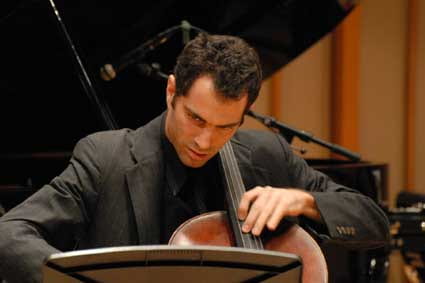Polish Music Center Newsletter Vol. 14, no. 1
2007 Highlights In Polish Music
Anniversaries
The Polish Sejm declared 2007 the Year of Karol Szymanowski, marking the 125th birth anniversary and 70th death anniversary of this great Polish composer. There were monthly features in the PMC Newsletter about the composer
It was also the Year of Artur Rubinstein, marking the 25th death anniversary and 120th birth anniversary one of Poland’s most accomplished pianists. The Łódź Philharmonic celebrated a double jubilee – the anniversary of its patron, Arthur Rubinstein, and 120th anniversary of the opening of Ignacy Vogel Concert Hall – with a concert featuring Chopin’s Piano Concerto no. 2 and Paderewski’s Polish Fantasy
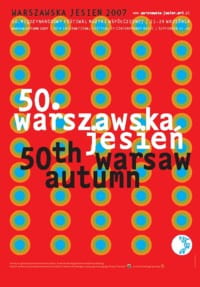 2007 marked the 50th anniversary of Poland’s most prestigious music festival, Warszawska Jesień [Warsaw Autumn Festival], held in Warsaw from September 21-29. Several special projects were planned for the occasion, including a “50 years of Warsaw Autumn” DVD and a new internet website at www.warsaw-autumn.art.pl.
2007 marked the 50th anniversary of Poland’s most prestigious music festival, Warszawska Jesień [Warsaw Autumn Festival], held in Warsaw from September 21-29. Several special projects were planned for the occasion, including a “50 years of Warsaw Autumn” DVD and a new internet website at www.warsaw-autumn.art.pl.
Argentine Polish Cultural Association celebrated the 4th year of their weekly Polish music broadcasts on Argentine National Radio
This year, Channel 2 of Polish Radio celebrated its 70th anniversary and the Polish Radio Orchestra and Chorus were saved from possible downsizing
On the 150th anniversary of Karol Kurpiński’s death and the 250th anniversary of Wojciech Bogusławski’s birth, the Polish National Opera presented Superstition, or the Cracovians and the Highlanders in late October – early November
Awards & Honors
The 6th W. Lutosławski International Cello Competition took place on February 22 – March 1, and the laureates were as follows – Grand prize: Marcin Zdunik (Poland), 2nd prize (ex aequo): Lionel Cottet (Switzerland) & Paul Wiancko (USA), and 3rd prize: Adam Krzeszowiec (Poland)
 Violinist Agata Szymczewska (right) received a Minister of Culture “Młoda Polska” [Young Poland] Stipend and the annual “Passport” award
Violinist Agata Szymczewska (right) received a Minister of Culture “Młoda Polska” [Young Poland] Stipend and the annual “Passport” award
Antoni Wit, conductor, received the Witold Lutosławski Medal from the W. Lutosławski Society in Warsaw
Trzy pieśni według Trakla [Three songs according to Trakl] by Paweł Szymańskiwas included on the “Recommended List” of the 54th International Composer’s Tribune organized by the UNESCO International Music Board. Szymański also won the Polish Minister of Culture award for music
In the 48th edition of Tadeusz Baird Young Composer’s Competition, organized by Polish Composer’s Union [ZKP], the following prizes were awarded: 1st prize – Wojciech Blecharz for dim for female voice, cello, accordion and piano; 2nd prize (ex-aequo) – Sławomir Krupczak for Lament for female voice, cello, piano and tape, and Artur Zagajewski for Glassmusic-motet for female voice, cello, accordion, piano and tape. Special Distinction – Zofia Dowgiałło for Triptych for baritone, cello, accordion and piano
Maria Fołtyn, director of the International Moniuszko Vocal Competition in Warsaw, was honored with the first Jan Kiepura Award and the eighth “Golden Scepter” Award
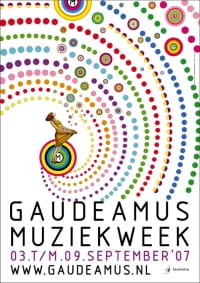 The French Académie des Beaux-Arts honored composer Piotr Moss with an award for outstanding accomplishment of creative activity
The French Académie des Beaux-Arts honored composer Piotr Moss with an award for outstanding accomplishment of creative activity
Member of the Polish Composer’s Union’s Circle of the Young, Anna Maria Przydworska, won a scholarship enabling her to attend the Gaudeamus Muziekweek in Amsterdam, Holland
The 1st Michał Spisak International Music Competition was held in Dąbrowa Górnicza from 16-27 September. View the results in the Oct Newsletter
Winner of ZKP’s annual Tadeusz Ochlewski Composition Competition: Jakub Polaczyk for Kombinacje na Olimpie [Combination on Olympus]
 A recording by Polish musician and pedagogue, Wojciech Kocyan, was included inGramophone Magazine’s 50 Greatest Classical Recordings
A recording by Polish musician and pedagogue, Wojciech Kocyan, was included inGramophone Magazine’s 50 Greatest Classical Recordings
Henryk Mikołaj Górecki was 32nd on the 100 Living Geniuses list (Creators Syntetics)
Results of the 8th Grzegorz Fitelberg Internat’l Competition for Conductors: Gold baton – Eugene Tzigane McDonough (USA); Silver baton – Lin Chen (China); Bronze baton – Sean Newhouse (USA). Details available in the Dec Newsletter
Winners of the 7th Ignacy Jan Paderewski Internat’l Piano Competition in Bydgoszcz: 1st prize – Nikita Mndojanc (Russia); 2nd prize – Julianna Awdiejewa (Russia); 3rd prize – Marianna Prjevalskaya (Spain); 4th prize – Lilit Gregorian (Armenia); and 5th prize (ex-aequo) – Melody Quah (Malaysia) and Pawieł Rajkierus (Russia)
Premieres
Hélène Jeanney, piano, Hanna Lachert, violin, of the Waterville Trio gave the NY premiere of K.Penderecki’s Sonata No. 2 for Violin and Piano at Carnegie Hall.
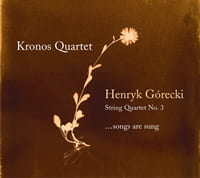 Kronos Quartet gave the West Coast (USA) premiere of Henryk Mikolaj Górecki’s String Quartet No. 3 Pieśnie śpiewają […songs are sung], Op. 67 on February 18, and the U.K. premiere July 29. The premiere recording was released on March 20th on Nonesuch Records
Kronos Quartet gave the West Coast (USA) premiere of Henryk Mikolaj Górecki’s String Quartet No. 3 Pieśnie śpiewają […songs are sung], Op. 67 on February 18, and the U.K. premiere July 29. The premiere recording was released on March 20th on Nonesuch Records
 The Verdehr Trio premiered Musica per Trio by young Polish composer Pawel Sydor at the Kosciuszko Foundation in NY
The Verdehr Trio premiered Musica per Trio by young Polish composer Pawel Sydor at the Kosciuszko Foundation in NY
Bettina Skrzypczak newest composition, entitled Initial, was premiered on May 13 in La Chaux-de-Fonds, Switzerland
On August 4, Piotr Moss’ composition Intrada for orchestra had its German premiere at the young.euro.classic Festival
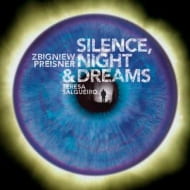 The World Premiere of Zbigniew Preisner’s Silence, Night and Dreams was presented in the Herod Atticus Theatre in Greece on September 4th. This piece was recorded on EMI Classics (0094639399925)
The World Premiere of Zbigniew Preisner’s Silence, Night and Dreams was presented in the Herod Atticus Theatre in Greece on September 4th. This piece was recorded on EMI Classics (0094639399925)
The World Premiere of Karol Szymanowski’s cantata Agawe was given on the final concert of Polish Radio’s 10th Music Festival on October 7. Written in 1917, this cantata was never finished by the composer – it was completed by Polish composer Piotr Moss, per a commission by Polish Radio for this year’s festival
A new opera by Włodek Pawlik, Via Sancta – Ojcu Świętemu [Sacred Way – Dedicated to the Pope], was premiered in Warsaw’s Grand Theater-National Operaon October 15
The World Premiere performance of Jan Krenz’s Requiem took place on November 23 in the Kraków Philharmonic
PMC News
The Polish Music Center celebrated the Year of Szymanowski with a concert on March 22nd – “Szymanowski & Modern Music in Poland.” Read a review of the concert in the April Newsletter

2007 Paderewski Celebration: The great Polish musician, patriot and statesman Ignacy Jan Paderewski was commemorated at the University of Southern California on October 4 with the placement of a Paderewski monument in his honor amongst the buildings of the Thornton School of Music and the annual Paderewski Lecture-Recital. (pictured at right with honored guests, Polish Ambassador Janusz Reiter and USC Provost C.L. Max Nikias, Photo: Doug Spice) Paderewski is the first Polish national to be recognized with a monument in Southern California. More about the event: Oct Newsletter
 PMHS Vol. 10 – Zygmunt Stojowski: Life and Music by Joseph A. Herter – is the first comprehensive biography of this long-neglected and undeservedly forgotten virtuoso pianist, composer, and pedagogue. The most recent in the PMC’s distinguished Polish Music History Series, this and other volumes can be ordered via email: polmusic@thornton.usc.edu or by phone: (213) 821-1356
PMHS Vol. 10 – Zygmunt Stojowski: Life and Music by Joseph A. Herter – is the first comprehensive biography of this long-neglected and undeservedly forgotten virtuoso pianist, composer, and pedagogue. The most recent in the PMC’s distinguished Polish Music History Series, this and other volumes can be ordered via email: polmusic@thornton.usc.edu or by phone: (213) 821-1356
Recordings
The celebrated Polish folk group, Trankapela, released their new album Over The Village – a continuation of the group’s musical imaginings of the time of Carpathian Klezmers
The disc of works by Liszt and Chopin performed by Yundi Li, winner of the 2000 Chopin Competition, won the Gramophone Magazine ‘s Editor’s Choice Award in March
 The National Frederic Chopin Institute has released the 1st four volumes of their series of Chopin works performed by highly esteemed pianists and laureates of the Chopin Competition on professionally restored Erard and Pleyel period pianos
The National Frederic Chopin Institute has released the 1st four volumes of their series of Chopin works performed by highly esteemed pianists and laureates of the Chopin Competition on professionally restored Erard and Pleyel period pianos
Antoni Wit and the Warsaw National Philharmonic released the first in a series of recordings of the complete works of Szymanowski on Naxos
Polish Radio presented a disc of archival recordings of Roman Maciejewski
On July 30th, the 2006 Paderewski Recitalist, Jonathan Plowright, released his most recent recording: Paderewski: Piano Sonata, Variations & Fugues (Hyperion CDA67562)
Vincent P. Skowronski’s latest recording, Skowronski Plays! ~ Avec Et Sans~ Volume II, Live in Concert (S:CR-08), including Szymanowski’s “Taniec z Harnasiow” from Harnasie, was released
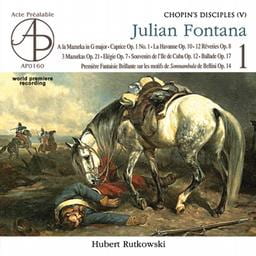 Herbert Rutkowski, winner of the International Chopin Competition in Hanover, Germany, recorded a world premiere album featuring the works of Julian Fontana, Chopin’s close friend and colleague (Acte Prealable AP0160 or US distributor: www.spinningdogrecords.com)
Herbert Rutkowski, winner of the International Chopin Competition in Hanover, Germany, recorded a world premiere album featuring the works of Julian Fontana, Chopin’s close friend and colleague (Acte Prealable AP0160 or US distributor: www.spinningdogrecords.com)
Rafał Blechacz, the first Polish winner of the Chopin Competition since Zimmerman, released his first recording with Deutsche Grammophon (DG 477 6592) – see more below
Polish Night Music, a collaboration between filmmaker David Lynch and pianist/composer Marek Zebrowski, has been released. There is also a track on the new Inland Empire soundtrack by the same name and featuring the same musicians
 Nigel Kennedy and the Polish Chamber Orchestra have released a recording of Chopin, Młynarski and Karłowicz entitled Polish Spirit (EMI 3 79934 2 )
Nigel Kennedy and the Polish Chamber Orchestra have released a recording of Chopin, Młynarski and Karłowicz entitled Polish Spirit (EMI 3 79934 2 )
Kronos Quartet released a DVD of Polish Quartets recorded live at the 2nd Polish Music Festival in Kraków in November 2006
Scholarship
The new Center for Documentation of the Life and Output of Witold Lutosławskihas opened in the freshly renovated Pusłowski Palace in Kraków

Norman Lebrecht achieved a rare exclusive interview with composer Henryk Mikołaj Górecki (at right, at USC in Los Angeles)
The Frederic Chopin Museum in Warsaw has obtained the manuscript of Chopin’s Fantaisie-Impromptu in C sharp Minor.
Lutosławski on Music, presenting the writings of the great composer as edited and translated by Zbigniew Skowron, was published by Scarecrow Press in October
A manuscript of what appears to be the oldest example of Polish opera has been discovered in the library if the University of Poznań in November (Polish Radio)
Performances
Polish pianist Piotr Anderszewski returned to the public spotlight in January, after five months dedicated to other pursuits, thrilling audiences at Walt Disney Hall (L.A.) and Carnegie Hall (NY), among others
 Ewa Podleś was triumphant in the title role of G. F. Handel’s Julius Caesar at the Seattle Opera in February and March. The great Polish contralto also used her time there to support the Polish Studies Endowment at the U. of Washington
Ewa Podleś was triumphant in the title role of G. F. Handel’s Julius Caesar at the Seattle Opera in February and March. The great Polish contralto also used her time there to support the Polish Studies Endowment at the U. of Washington
Chinese pianist Lang Lang brought his Chopin mastery to Los Angeles and Warsaw in February
The piano studio of Prof. Arthur Greene at the U. of Michigan in Ann Arbor presented the complete solo piano works of Fryderyk Chopin chronologically in a concert series running March 6 through April 14, 2007
A rarity by Witold Lutosławski – Grave: Metamorphoses for cello & piano (1981) – was performed by American cellist Ralph Kirshbaum and Swedish pianist Peter Jablonski at Queen Elizabeth Hall in London
Polish-born pianist Anna Kijanowska performed “An Homage to Karol Szymanowski” at Merkin Hall in NY on March 29
One of Poland’s most talented and creative groups, accordion ensemble Motion Trio, was featured Skirball Center’s ongoing accordion music series, “Compressing the World”
The Penderecki String Quartet performed Polish-Canadian composer Piotr Grella-Mozejko’s music on May 11 in Alberta, Canada
 Polish cellist Evva Mizerska performed a series of concerts presenting some of the most interesting works of the Polish modern cello repertoire from March – October
Polish cellist Evva Mizerska performed a series of concerts presenting some of the most interesting works of the Polish modern cello repertoire from March – October
Polish baritone Mariusz Kwiecień delighted audiences in the title role of San Francisco Opera’s Don Giovanni
Monsieur Chopin, a one-man play/musical performance depicting the life of Polish composer Fryderyk Chopin, was performed masterfully by Hershey Felder in L.A.’s Geffen Playhouse
Polish violinist Jan Stanienda visited USC again this fall, giving a Visiting Artist Masterclass and leading the Thornton Chamber Orchestra
Polish Independence Day was celebrated in style all over the world – see the Nov Newsletter and Dec Newsletter for details
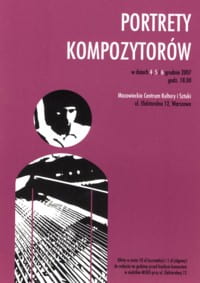 On October 25, Polish composer and pianist Zygmunt Krauze presented what he calls “The Last Recital” in Cornell University’s Barnes Hall in Ithaca, NY
On October 25, Polish composer and pianist Zygmunt Krauze presented what he calls “The Last Recital” in Cornell University’s Barnes Hall in Ithaca, NY
On November 4 – 6, the Mazovian Culture and Art Center presented a series of concerts dedicated to Polish composers, including Mariusz Dubaj, Weronika Ratusińska, Wojciech Ziemowit Zych, Zbigniew Kozub, Maciej Zieliński and Bettina Skrzypczak
PMC News
Library Donations To PMC
Many interesting items were recently donated to the Polish Music Center from our friends all over the world. We are particularly grateful to the following persons and institutions for enriching our library holdings:
- Mieczysław Kominek, Director of Polish Music Information Centre in Warsaw, Poland, for a set of eleven CDs containing contemporary music performed during the 2006 Warsaw Autum Music Festival
- Stanisław Bukowski, Director of the Polish Radio, for a selection of CD recordings, including:
- Z Wielkopolski Rodem – Karol Kurpiński, PRCD 1063
- Włodek Pawlik – Kolędy Polskie, Polonia Records CD 338
- Piwnica pod Baranami, PRCD 1051
- Roman Maciejewski, PRCD 885
- TOTA Quartet – Zbigniew Wegehaupt, PRCD 1020
- Wagner – Der fliegende Holländer, ACD 143-2
- Kronos Quartet DVD – Polish Quartets
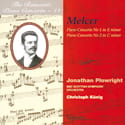 Krzysztof and Grażyna Teodorowicz, for preparing a cycle of eight 50-minute radio programs about Henry Vars, aired during November of 2007, and for donating CD copies of these programs to PMC
Krzysztof and Grażyna Teodorowicz, for preparing a cycle of eight 50-minute radio programs about Henry Vars, aired during November of 2007, and for donating CD copies of these programs to PMC- Joseph Herter, The Kosciuszko Foundation representative in Warsaw, for donation of programs and brochures of the Stojowski Celebration in Dublin, Ireland, at the National Gallery in November 2007, and the CD of Piano Concertos by Henryk Melcer in performance by Jonathan Plowright
(Hyperion CDA67630) - Andrzej Kosowski, Director of Polish Music Publishing Company (PWM), for materials and programs from the Third Annual Festival of Polish Music in Krakow, Poland, in November 2007
- Henryk Martenka, Director of the International Paderewski Piano Competition in Bydgoszcz, Poland, for programs and catalogue of the Competition
- The Rowman & Littlefield Publishing Group, for Lutosławski on Music, a new English-language translation of Lutosławski writings by Zbigniew Skowron (see more information below)
News
Lutosławski On Music
 Lutosławski on Music
Lutosławski on Music
Edited and Translated by Zbigniew Skowron
Published by Scarecrow Press, October 2007
Book Description: The writings of twentieth-century Polish composer Witold Lutosławski reveal many important aspects of his approach to music and his viewpoints as an artist and as a man. In Lutosławski on Music, the first full collection of writings by this famous composer, Zbigniew Skowron has amassed an exciting assortment of essays, speeches, lectures, and articles, many of which are newly translated in English and previously unpublished.
After an introductory autobiography, the writings, grouped in five parts, illustrate various aspects of the composer’s creativity, and discuss musical form, compositional technique, and perception. Lutosławski examines his own works as well as those of other composers, and expresses his views on crucial aspects of twentieth-century music, including the role of Schoenberg and Debussy and the impact of the western avant-garde of the 1950s. The book also contains Lutosławski’s Artistic Diary, his “notebook of ideas” written from 1959 to 1984 containing intensely personal reflections that do not appear in his public speeches and writings. Concluding with a select bibliography, this collection will give readers a unique and comprehensive overview of the man and his music, encouraging a full appreciation of Lutosławski’s compositional technique and aesthetic views, as well as his position in the history of twentieth-century music.
Zbigniew Skowron is a professor at the Institute of Musicology at the University of Warsaw and the editor of Lutosławski Studies (2001).
[The above description is taken from the website of Scarecrow Press, where this book is currently on sale.]
Kulenty Concerts / Premiere
 In January, there will be two concerts in the Netherlands devoted to the music of Polish composer Hanna Kulenty (pictured at right). The first concert on January 18 will include the World Premiere of Kisses & Crosses, written in 2007 for piano and percussion. These concerts will feature the Ensemble de Ereprijs, conducted by Wim Boerman, with soloists Frank Peters (piano), Marco Blaauw (trumpet) and Arnold Marinissen (percussion). The performance dates and venues are: 18 January 2008 at theKorzo Theater, The Hague, The Netherlands and 22 January 2008 at Musis Sacrum, Arnhem, The Netherlands.
In January, there will be two concerts in the Netherlands devoted to the music of Polish composer Hanna Kulenty (pictured at right). The first concert on January 18 will include the World Premiere of Kisses & Crosses, written in 2007 for piano and percussion. These concerts will feature the Ensemble de Ereprijs, conducted by Wim Boerman, with soloists Frank Peters (piano), Marco Blaauw (trumpet) and Arnold Marinissen (percussion). The performance dates and venues are: 18 January 2008 at theKorzo Theater, The Hague, The Netherlands and 22 January 2008 at Musis Sacrum, Arnhem, The Netherlands.
Concert Program:
A Sixth Circle – Marco Blaauw and Frank Peters
Piano Concerto No. 1 – Frank Peters and Ensemble de Ereprijs
Brass No. 1 – Marco Blauw, trumpet solo
A Third Circle – Frank Peters, piano solo
Island – Marco Blaauw and Ensemble de Ereprijs
Kisses & Crosses – World Premiere – Frank Peters and Arnold Marinissen (Jan 18 only)
Sesto – Frank Peters, piano solo (Jan 22 only)
Moss World Premiere
 The world premiere of L’abbaye dans la forêt by Piotr Moss will take place at the Théâtre des Champs-Elysées in Paris on January 13. This work is the next section in Moss’s orchestral cycle Five Tableaus of Caspar David Friedrich. The composition, commissioned by Musique nouvelle en liberté, will be performed by the Lamoureux Orchestra under the direction of Daniel Kawka. Each section of the Five Tableaus is being performed over the course of the Lamoureux Orchestra’s 2007-2008 season, culminating in a presentation of the work in its entirety during the final concert on June 1, 2008.
The world premiere of L’abbaye dans la forêt by Piotr Moss will take place at the Théâtre des Champs-Elysées in Paris on January 13. This work is the next section in Moss’s orchestral cycle Five Tableaus of Caspar David Friedrich. The composition, commissioned by Musique nouvelle en liberté, will be performed by the Lamoureux Orchestra under the direction of Daniel Kawka. Each section of the Five Tableaus is being performed over the course of the Lamoureux Orchestra’s 2007-2008 season, culminating in a presentation of the work in its entirety during the final concert on June 1, 2008.
Piotr Moss, Photo: Joseph A. Herter
[JH]
Pay Dispute At Olsztyn Philharmonic
Sixty musicians at the Olsztyn Philharmonic are demanding higher pay. According to the union spokesman, Cezary Gryc, the players’ average monthly paycheck is 1700 PLN [700 USD] before taxes, which is the lowest pay of any orchestra in Poland. The musicians demand an increase to 3000 PLN per month [1250 USD] whilst the management has offered only a 12% increase. Jacek Protas, Marshall of the Mazury Province, promised to hold talks with the Philharmonic’s Board of Directors and the protesting musicians. This conflict is taking place at the same time as Janusz Przybylski steps in as the new Artistic Director of the Philharmonic (as of Jan. 1, 2008).
Olsztyn Philharmonic does not have its own concert hall and for many years the orchestra has performed in the local music school auditorium. Late last year there was a groundbreaking for the new building that will house the Philharmonic. The construction cost, estimated to be about fifteen million dollars, is to be partially defrayed by European Union funds.
[MZ]
A Happy New Year For Motion Trio
 Poland’s celebrated accordion ensemble, Motion Trio, is ringing in the New Year on quite a high note. On Jan 3rd 2008, Motion Trio members Janusz Wojtarowicz, Paweł Baranek, and Marcin Gałażyn visited famed Polish composer Krzysztof Penderecki to present their arrangement of Ciaccona in memoriam Giovanni Paolo II. This arrangement for three accordions will have its world premiere at Carnegie Hall in New York on January 13th, 2008. Motion Trio’s Carnegie Hall performance is dedicated to the memory of the great accordionist Andrzej Krzanowski. In addition to the Penderecki premiere, the concert program will feature music by Henryk Górecki, Janusz Wojtarowicz/Jacek Holubowski, Wojciech Kilar, and the Motion Trio members. For concert details, visit the Carnegie Hall website, www.carnegiehall.org.
Poland’s celebrated accordion ensemble, Motion Trio, is ringing in the New Year on quite a high note. On Jan 3rd 2008, Motion Trio members Janusz Wojtarowicz, Paweł Baranek, and Marcin Gałażyn visited famed Polish composer Krzysztof Penderecki to present their arrangement of Ciaccona in memoriam Giovanni Paolo II. This arrangement for three accordions will have its world premiere at Carnegie Hall in New York on January 13th, 2008. Motion Trio’s Carnegie Hall performance is dedicated to the memory of the great accordionist Andrzej Krzanowski. In addition to the Penderecki premiere, the concert program will feature music by Henryk Górecki, Janusz Wojtarowicz/Jacek Holubowski, Wojciech Kilar, and the Motion Trio members. For concert details, visit the Carnegie Hall website, www.carnegiehall.org.
Białystok Phil Concerts
 The Białystok Philharmonic Orchestra has two very interesting concerts on their calendar this January. On Friday, January 4th at 7:00 pm, the Philharmonic will present a program entitled “The Unknown face of Witold Lutosławski,” featuring several different compositions by this major figure of 20th century music. Artists include Mariusz Klimek – vocalist, Artur Grudziński – piano, Krzysztof Herdzin – piano and keyboard instruments, Cezary Konrad – percussion, Marek Podkowa – saxophone (tenor), and Marcin Murawski – bass guitar.
The Białystok Philharmonic Orchestra has two very interesting concerts on their calendar this January. On Friday, January 4th at 7:00 pm, the Philharmonic will present a program entitled “The Unknown face of Witold Lutosławski,” featuring several different compositions by this major figure of 20th century music. Artists include Mariusz Klimek – vocalist, Artur Grudziński – piano, Krzysztof Herdzin – piano and keyboard instruments, Cezary Konrad – percussion, Marek Podkowa – saxophone (tenor), and Marcin Murawski – bass guitar.
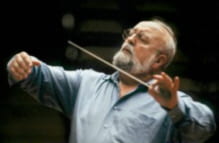 On Friday, January 18th at 7:00 pm, the Białystok Philharmonic will celebrate the anniversary of the 75th birthday and 55th year of artistic work of composer Krzysztof Penderecki. The concert will inaugurate this special anniversary year, with the composer himself conducting the Białystok Philharmonic Orchestra and choir. Special guest performers Ewa Biegas – soprano, Ewa Wolak – mezzo-soprano, and Vytautas Juozapaitis – baritone will also share the stage. Works presented will include Penderecki’s Symphony no. 8 “Lieder der Vergänglichkeit” and Dvořák’s Symphony no. 8 in G major op. 88.
On Friday, January 18th at 7:00 pm, the Białystok Philharmonic will celebrate the anniversary of the 75th birthday and 55th year of artistic work of composer Krzysztof Penderecki. The concert will inaugurate this special anniversary year, with the composer himself conducting the Białystok Philharmonic Orchestra and choir. Special guest performers Ewa Biegas – soprano, Ewa Wolak – mezzo-soprano, and Vytautas Juozapaitis – baritone will also share the stage. Works presented will include Penderecki’s Symphony no. 8 “Lieder der Vergänglichkeit” and Dvořák’s Symphony no. 8 in G major op. 88.
Benedetti & Szymanowski
 Nicola Benedetti will make her U.S. debut in a recital at Pepperdine University in Malibu on January 13th and then a repeat performance at the Irvine Barclay Theatre in Costa Mesa on January 15th. This young rising violin star has released two special Deutsche Grammophon recordings that speak for themselves, musically. On the first one she offers a stunning Szymanowski Violin Concerto together with works by Massenet, Saint-Saens, and Tavener. The second CD features magnificent performances of Mozart, Mendelssohn and MacMillan. You will not want to miss these concerts!!!
Nicola Benedetti will make her U.S. debut in a recital at Pepperdine University in Malibu on January 13th and then a repeat performance at the Irvine Barclay Theatre in Costa Mesa on January 15th. This young rising violin star has released two special Deutsche Grammophon recordings that speak for themselves, musically. On the first one she offers a stunning Szymanowski Violin Concerto together with works by Massenet, Saint-Saens, and Tavener. The second CD features magnificent performances of Mozart, Mendelssohn and MacMillan. You will not want to miss these concerts!!!
[GF]
Ms. Benedetti was the winner of BBC Music’s Young Musician Award in 2004. See her award-winning performance of the Szymanowski Violin Concerto here: www.youtube.com/watch?v=qJia2-wfqk8&feature=related.
2008 Chopin Festival – Florida
 From January to April, on the last Saturday and Sunday of the month, the Florida Council of the Chopin Foundation of the U.S. will present its 2008 Chopin Festival: Chopin for All. The concerts on Saturday are in Ft. Lauderdale at 7:00 pm, in the Broward County Main Library at 100 S. Andrews Avenue. The concerts on Sunday are in Coral Gables at 3:00 pm, at the Granada Presbyterian Church at 950 University Drive.
From January to April, on the last Saturday and Sunday of the month, the Florida Council of the Chopin Foundation of the U.S. will present its 2008 Chopin Festival: Chopin for All. The concerts on Saturday are in Ft. Lauderdale at 7:00 pm, in the Broward County Main Library at 100 S. Andrews Avenue. The concerts on Sunday are in Coral Gables at 3:00 pm, at the Granada Presbyterian Church at 950 University Drive.
January’s featured musician is emerging American artist Sean Chen. In February, the duo of Stanisław Drzewiecki, pianist, and Margot Zarzycka, violinist, will take the stage. March will bring the Young Pianists Concert: a complete program of the music of Chopin played by the finest classical piano students from both Miami-Dade and Broward Counties. Finally, in April, the Chopin Foundation will present the winners of the 2007 National Piano Competition in Poland. Details are available here: www.chopin.org.
Chopin & Szymanowski In NY
Three “Musicians from Caramoor” – Timothy Fain, violin; Edward Arron, cello; and Andrew Armstrong, piano – will perform on Sunday, January 20, at 3pm at the Kosciuszko Foundation in New York. Their all-Polish program consists of works by Chopin and Szymanowski, and features the virtuosic but rarely-heard Piano Trio in G minor, Op. 8, of Chopin. This same Piano Trio was also recently heard on the West Coast at the gala concert of the Paderewski Reprise in Paso Robles, CA.
Tomaszewski Plays Stojowski
 Tomasz Tomaszewski will be the featured soloist in performances Zygmunt Stojowski’s Violin Concerto with the Olsztyn and Bialystok Philharmonic Orchestras during the 2008-09 concert season. Piotr Borkowski will be the conductor of both performances. Mr. Tomaszewski has been the concertmaster of the Deutsche Opera in Berlin since 1982 and became a full professor at the University of Arts in Berlin in 2001.
Tomasz Tomaszewski will be the featured soloist in performances Zygmunt Stojowski’s Violin Concerto with the Olsztyn and Bialystok Philharmonic Orchestras during the 2008-09 concert season. Piotr Borkowski will be the conductor of both performances. Mr. Tomaszewski has been the concertmaster of the Deutsche Opera in Berlin since 1982 and became a full professor at the University of Arts in Berlin in 2001.
[JH]
Chopin In Texas
This January, the city of Corpus Christi in Texas will host the Annual Chopin Piano Competition organized by the Fryderyk Chopin Society of Texas. On Saturday, January 19, an international group of pianists aged 16 – 26 will compete for the main prize. The young artists will be evaluated by a jury consisting of prominent European and American judges. The repertoire requirements are based on the first stage of the 2010 International Chopin Piano Competition in Warsaw. The performances will be open to the public. More information is available on the Chopin Society website.
[Information provided by www.infochopin.pl]
The Kudajczyk Saga Continues
 You may remember the story from our July Newsletter about a Polish janitor at Glascow University in Scotland who was discovered to be a virtuoso pianist. Aleksander Kudajczyk’s talent has continued to emerge, as he has begun playing for University dinners and even film scores. But the real metamorphosis will begin on December 8th, when Mr. Kudajczyk will leave his janitorial job behind and begin (or rather continue) his career as a professional musician.
You may remember the story from our July Newsletter about a Polish janitor at Glascow University in Scotland who was discovered to be a virtuoso pianist. Aleksander Kudajczyk’s talent has continued to emerge, as he has begun playing for University dinners and even film scores. But the real metamorphosis will begin on December 8th, when Mr. Kudajczyk will leave his janitorial job behind and begin (or rather continue) his career as a professional musician.
Andy McSmith from the UK’s Independent talks about the many stages of Mr Kudajczyk’s saga, and its implications for the Polish immigrant situation in the UK, in his article “From a cleaner to a concert pianist, the Polish immigrant who hit the right note in Britain” (7 December 2007):
[Mr Kudajczyk’s] gift for music had not passed unnoticed in his home town of Katowice, where he started playing piano at the age of four, graduating from the town’s Karol Szymanowski Academy of Music, and tried to earn a living by teaching.
Although Poland has been a member of the EU since 2004, job prospects and living standards are still well below the UK level – which is why about 800,000 Poles have migrated to the UK looking for work. Even the £400 a month he earned as a cleaner, which put him right at the bottom of the UK pay scale, was a substantial improvement on a music teacher’s wage in Poland, which is around 900 zlotys, or £180, a month. “In Poland I played jazz and classical piano in restaurants and I also played concerts on cruise lines in America,” said Mr Kudajczyk. “I came to Scotland because I want to settle down, and the opportunities to make a living are better here than in Poland. I found work, cleaning the law department in the university from 6am to 10 am, then I practice when I can….The only sour note in Mr Kudajczyk’s tale is that the news that a Polish cleaner was giving concert performances dredged up some of the usual anti-immigrant comments.
Awards
Knapik Awarded
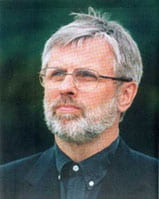
The Juliusz Ligon Prizes for Outstanding Contributions to the Region of Silesia were awarded in Katowice on December 22, 2007. Bishop Gerard Bernacki, the President of the Award Committee, presented awards to Father Professor Zygfryd Glaeser, visual artist Wiktor Ostrzolek, and the President of the Katowice Music Academy, Professor Eugeniusz Knapik. A Special Prize was awarded to the Library of Silesia.
Formerly a student of Henryk Mikołaj Górecki (composition) and Czesław Stańczyk (piano) at the State Higher School of Music in Katowice, Eugeniusz Knapik is currently a professor in the Department of Composition, Conducting and Music Theory and President of that same institution, which is now called the Music Academy of Katowice. In 1976, he received a French government scholarship to study composition with Olivier Messiaen in Paris. For more information about this composer and pedagogue, please visit the website of Warsaw’s Polish Music Information Centre.
Book Reviews
Chopin – Piano Music
By Gary Fitelberg
“The piano bard, the piano rhapsodist, the piano mind, the piano soul is Chopin”
-Anton Rubinstein-
Attention: all lovers of Chopin and piano – Dover Publications has published a series of books of Chopin compositions for piano. These include the following:
* Complete Preludes & Etudes
* Complete Ballades, Impromptus & Sonatas
* Waltzes & Scherzos
* Mazurkas
* Fantasy in F Minor, Barcarolle, Berceuse and other works for Solo Piano
* Chopin Masterpieces for Solo Piano – 46 Works
Chopin was the greatest composer of piano music in the 19th century, and perhaps of all time. He was the only great composer who wrote almost entirely for the piano, and his works are of such a uniformly high quality that they are all absolutely essential in the repertoire of any aspiring pianist.
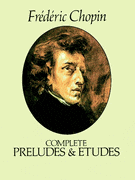 The Preludes & Etudes (Dover 0-486-24052-5) are exquisitely beautiful examples of his genius. Numbering 52 pieces in all, they are reproduced from the authoritative Mikuli edition and are now available for the first time in a low-priced, one volume publication. The opus listings are: 25 Preludes – Op.28, Nos. 1-24; Prelude in C-sharp Minor. Op. 45.
The Preludes & Etudes (Dover 0-486-24052-5) are exquisitely beautiful examples of his genius. Numbering 52 pieces in all, they are reproduced from the authoritative Mikuli edition and are now available for the first time in a low-priced, one volume publication. The opus listings are: 25 Preludes – Op.28, Nos. 1-24; Prelude in C-sharp Minor. Op. 45.
27 Etudes – Op. 10, Nos. 1-12, Op.25, Nos. 1-12; and Trois Nouvelles Etudes.
The Complete Ballades, Impromptus & Sonatas (Dover 0-048-24164-5) includes Chopin’s four ballades, four impromptus and three sonatas, which are amongst the composer’s most mature works, rivaled only by his scherzos and polonaises for extended thematic development and formal structure. In their broader scope and more dramatic impact, these important compositions show us Chopin’s other face, balancing those brief, melodious pieces – the waltzes, preludes and mazurkas – that make up his very popular repertoire. The opus listings included are as follows: 4 Ballades – Op. 23, No. 1 in G Minor; Op. 38, No. 2 in F Major; Op. 47 in A-flat Major; and Op. 52, No. 4 in F Minor.
4 Impromptus – Op. 29, No 1 in A-flat Major; Op. 36, No. 2 in F-sharp Major; Op. 51, No. 3 in G-flat Major; and Op. 66 in C-sharp Minor; 3 Sonatas – Op. 4, No. 1 in C Minor; Op. 35, No. 2 in B-flat Minor; and Op. 58, No. 3 in B Minor.
Waltzes & Scherzos (Dover 0-486-24316-8) illustrates Chopin’s special gift and remarkable ability to transform conventional musical forms into unique and memorable works of art for solo piano. Some are as compact as his fifteen waltzes. Some are as complex and extended as his fifteen scherzos.
The waltzes bear only a superficial resemblance to the popular Viennese dance music of the time. Sparkling graceful and tinged with an ineffable melancholy, these compositions succeed in conveying an air of mystery while retaining their ballroom splendor. Though they yield countless treasures even to keyboard veterans, most of these pieces present little technical difficulty to the player of only moderate and modest skill.
A “scherzo” was originally a musical joke. One finds little humor, however, in Chopin’s musical scherzos. Of them, Schumann once asked, “How is gravity to clothe itself if jest goes about in dark veils?” Chopin’s scherzos are truly novel metamorphoses of the form – tumultuous emotional outpourings that frequently attain tragic heights. Their originality and profundity well reward the effort required to master these relatively difficult compositions. This volume includes the following compositions and opus numbers: 15 Waltzes – Op. 18; Op. 34, Nos 1-3; Op. 42; Op. 64, Nos. 1-3; Op.69, Nos. 1-2; and Op. 70, Nos. 1-3, E Minor (1830) and E Major (1829). 4 Scherzos – Ops. 20, 31, 39, and 54.
Mazurkas (Dover 0-486-25548-4) are amongst the best-loved and most performed of Chopin’s piano compositions. This volume includes 51 works – remarkable for their wide emotional appeal, advanced chromatic techniques and piansistic devices, and ranging in difficulty from relatively easy, for advanced beginners, to quite challenging, for the accomplished pianist.
Fantasy in F Minor, Barcarolle, Berceuse and other works for Solo Piano (Dover 0-486-25950-1) feature piano works of exquisite quality. Chopin’s piano works, reknowned for their technical brilliance, also invariably project the composer’s mercurial moods. Their complex emotional content often lies close to the surface. A sparkling and graceful passage may be tinged with melancholy. A dark moment may be crowned with a note of triumph. This superb collection of fifteen of Chopin’s works for piano reflects these compelling qualities in some of the greatest piano compositions of the Romantic period.
First and foremost amongst these piano pieces is perhaps the most magnificent Fantasy in F Minor, Op. 49; as well as the often played Barcarolle, Op. 60; Berceuse, Op. 57; Allegro de Concert, Op. 22; and Andante spianato, Op. 22. One can also not neglect Bolero, Op. 19; Tarantelle, Op. 43; Funeral March in C Minor, Op. 72, No. 2; Three Ecossaises, Op. 72, No. 3; Introduction and Variations on “Je vends des scapulaires,” Op. 12; Introductions on a German Air; Variation no. 6 from the Hexameron; Rondo in C Minor, Op.1; Rondo “a la Mazur” in F Major, Op.5; and Introduction and Rondo, Op.16.
Chopin Masterpieces for Solo Piano – 46 Works (Dover 0-486-40150-2) is a collection containing 46 of Chopin’s best loved and most important pieces. One might say Chopin’s greatest hits. Included are Ballade No. 1 in G Minor, Berceuse, three Ecossaises, five Etudes (including the fiery “Revolutionary”), Fantasy Impromptu, eight mazurkas, seven Nocturnes, three Poloniases (including the enormously popular “Militaire”), nine preludes, Scherzo no. 2 in B-flat Minor and six waltzes (including the ‘Minute Waltz”)
As Chopin’s student and later his teaching assistant, Karol (Carl) Mikuli (1919-1897) – Polish pianist, composer, conductor and teacher – was in a particularly privileged and advantageous position to take into account all that the master brought to his playing and teaching. His editorial contribution to these volumes reflects his understanding of the principles that underlie this body of work, imparted to him in word in deed by the composer directly himself.
Mikuli’s historical and interesting forward “Chopin, Pianist and Teacher” included in these authoritative volumes (originally in German) was written in 1879, for his landmark edition of Chopin’s piano music, originally published by FR. Kistner, Leipzig. Lamenting all the innumerable errors found in earlier French, German, and English publications, he sought to provide the reader with a reliable edition based on several sources – especially printed scores corrected in Chopin’s own hand; scores in which Mikuli himself noted down the composer’s comments during lessons of students; and significant reminiscences by discerning witnesses to Chopin’s rare performances. The English translation of the original text – lightly edited for the present publication – was first prepared for the 1895 American edition. While markedly shorter than the original, this note touches on all the essential issues, concerns and points of view involved in this comprehensive edition.
Whether entertaining yourself or family and friends, or at concert performances, you can spend hours playing the piano works of the great composer and pianist Fryderyk Chopin. These reasonably priced Dover editions give students of all levels the opportunity to explore his greatest works.
Discography
20th Century Carols
 Karolju: Christmas Music from Rouse, Lutoslawski and Rodrigo
Karolju: Christmas Music from Rouse, Lutoslawski and Rodrigo
Christopher Rouse’s Karolju, selections from Witold Lutosławski’s 20 Polish carols, and Joaquin Rodrigo’s Retablo de Navidad
David Zinman, cond.; BBC Symphony Orchestra and Philharmonia Chorus
RCA Red Seal 88697-11561-2
A delightful and varied collection of some the best Christmas music that the 20th century has to offer! Julie Amacher of Minnesota Public Radio has this to say about the Lutosławski contributions to the disc: “Seventeen of his 20 Polish carols appear on this new Christmas collection. I never tire of listening to these beautiful songs. They vary in energy and style.”
Impromtu Multicolore On Disc
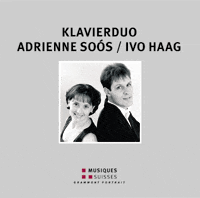 Klavierduo
Klavierduo
Rudolf Kelterborn (b.1931): Sonata für zwei Klaviere (1954/55); Michel Roth (b.1976): molasse vivant (2004) ; Krzysztof Meyer (b.1943): Impromptu multicolore op. 92 ; Dieter Ammann (b.1962): Regard sur les traditions (avec quelques trompe l’oreille) (1995) ; R. Kelterborn: Klavierstück VII Quinternio(2005)
Adrienne Soos and Ivo Haag, piano
Musiques Suisses CTS-M 107
This disc includes a rare recording of Impromptu multicolore, a work for two pianos by Krzysztof Meyer. It features performances of pieces for 4 hands/2 pianos by piano duo Adrienne Soos and Ivo Haag.
Blechacz Online
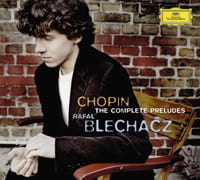 It is now possible to buy the Deutsche Grammophon recording of the complete Chopin Preludes as performed by Rafał Blechacz, winner of the 2005 Chopin Competition in Warsaw, online as MP3 files. Visit www2.deutschegrammophon.com for more information.
It is now possible to buy the Deutsche Grammophon recording of the complete Chopin Preludes as performed by Rafał Blechacz, winner of the 2005 Chopin Competition in Warsaw, online as MP3 files. Visit www2.deutschegrammophon.com for more information.
Szymanowski On DUX
 KAROL SZYMANOWSKI: VIOLIN & PIANO WORKS
KAROL SZYMANOWSKI: VIOLIN & PIANO WORKS
Karol Szymanowski (1882-1937): Roxana’s song from King Roger; Kurpie song; Pieśni księżniczki z baśni [Songs of the fairy-tale princess]; Prelude, Op. 1 No. 1, in B minor; Three Paganini caprices; and Dance from Harnasie
Piotr Pławner, violin and Wojciech Świtała, piano
DUX 0614
 SZYMANOWSKI: PIANO WORKS
SZYMANOWSKI: PIANO WORKS
Karol Szymanowski (1882-1937): Métopes Op. 29, Studies Op. 33, Piano Sonata No. 3 Op. 36, and Polish dances (1926)
Joanna Domańska, piano
DUX 0615
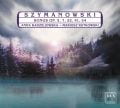 KAROL SZYMANOWSKI – SONGS OP. 5, 7, 32, 41, 54
KAROL SZYMANOWSKI – SONGS OP. 5, 7, 32, 41, 54
Karol Szymanowski (1882-1937): Three fragments from poems by Jan Kasprowicz op. 5; Three songs op. 32 to words by Dymitr Dawydow; Four songs op. 41 to words by Rabindranath Tagore; and Seven songs op. 54 to words by James Joyce
Anna Radziejewska, mezzo-soprano and Mariusz Rutkowski, piano
DUX 0621
Performances
Wajda Film Weekend: A Real Winner!
A review by Gary Fitelberg
Music can create the mood of a film and greatly contribute to its success. Andrzej Wajda, film director par excellence, is recognized for making the most of music in his visual masterpieces. Soundtracks to Wajda’s films include music by the most famous and greatest Polish composers and span many styles and eras from Frederic Chopin and Karol Szymanowski to Taduesz Baird and Wojciech Kilar. Jan Krenz, currently Conductor Laureate of the National Polish National Radio Symphony Orchestra, also composed music for such Wajda classics as Ashes and Diamonds, Eroica, and Kanał. Recently, Wajda asked Krzysztof Penderecki for a musical collaboration on his latest film.
During mid December, five of Wajda’s films were featured in public and private screenings in Los Angeles. Four of these were organized by American Cinematheque, a Los Angeles institution devoted to showcasing classic movies and holding film forums at their flagship landmarks—The Egyptian Theatre in Santa Monica and the Aero Theatre in Hollywood. The other screening that followed the weekend-long celebrations of film and music from Poland was held at the Writers’ Guild Theatre.
The Guild’s invitation-only screening featured Wajda’s latest film, Katyń. Like many other Wajda films, it carries a strong political message. Based on the book Post Mortem by Andrzej Mularczyk, Katyń is Poland’s official entry for the Academy Awards and the Annual Golden Globes. The film depicts the events surrounding the mass murder of thousands of Polish military officers and intelligentsia by the Soviet Secret police during World War II. Wajda’s father was among those killed and t tragic chapter in Wajda’s family history affected him deeply and personally:
After many attempts and much thought, I am now certain that a film about Katyń cannot set a goal of discovering the whole truth about that event since it is now a historical and political fact. […] I see my film about Katyń as a story of a family separated forever, about great illusions and the brutal truth about the Katyń crime. […] a film about individual suffering which evokes images of much greater emotional content than naked historical facts. A film that shows the terrible truth that hurts, whose characters are not the murdered officers, but women who await their return every day, every hour, suffering inhuman uncertainty. […]
[Quoted from the Director’s Statement on Katyn.netino.pl]
 Wajda’s Katyń uses material from diaries and letters to narrate the lives of four fictional officers and their families, showing Poland’s tragic predicament as the country was invaded by the Nazis on September 1, 1939 and by the Soviets some two weeks later. After almost two months of heroic and unequal struggle, many Polish soldiers were taken prisoner by the two conquerors. At first, the disappearance of over 15,000 Polish officers in the Eastern borderlands was a mystery. The families, who had been receiving letters from the imprisoned soldiers, were unable to find out why the correspondence had suddenly stopped. The explanation came a few years later, when in the spring of 1943 the Nazis had invaded Soviet Union and discovered the mass graves. However, Soviet propaganda blamed the deaths on Hitler and harshly punished anyone who dared to think otherwise. Only in 1990 the new Russian government officially recognized that Stalin’s secret police, the NKVD, bore responsibility for the Katyń forest mass murder.
Wajda’s Katyń uses material from diaries and letters to narrate the lives of four fictional officers and their families, showing Poland’s tragic predicament as the country was invaded by the Nazis on September 1, 1939 and by the Soviets some two weeks later. After almost two months of heroic and unequal struggle, many Polish soldiers were taken prisoner by the two conquerors. At first, the disappearance of over 15,000 Polish officers in the Eastern borderlands was a mystery. The families, who had been receiving letters from the imprisoned soldiers, were unable to find out why the correspondence had suddenly stopped. The explanation came a few years later, when in the spring of 1943 the Nazis had invaded Soviet Union and discovered the mass graves. However, Soviet propaganda blamed the deaths on Hitler and harshly punished anyone who dared to think otherwise. Only in 1990 the new Russian government officially recognized that Stalin’s secret police, the NKVD, bore responsibility for the Katyń forest mass murder.
Katyń is certainly one of Wajda’s most important and long-awaited films, perhaps even the most important among many of his other masterpieces. It is particularly dramatic, evocative, and well-made. Katyń’s tragic message and powerful imagery are likely to remain with the viewer for a very long time. In addition to featuring a stellar Polish cast and the award-winning Director of Photography, Paweł Edelman, the film uses a wide selection of music by one of the greatest contemporary composers, Krzysztof Penderecki.
The American Cinematheque retrospective, “Last of the Titans: Classics From the Legendary Polish Filmmaker Andrzej Wajda,” presented four of the director’s most famous features, including Kanał (1957), Ashes and Diamonds (1958), The Promised Land(1975), and Man of Marble (1977). This retrospective was made possible by Akson Studio, Telewizja Polska S.A., Polish Film Institute and ELMA (European Languages and Movies in America), with additional support from the Skirball Cultural Center.

fot: Krzysztof Wojcik/FORUM
Andrzej Wajda was born in northeastern Poland in 1926. After the war he relocated to Kraków, where he enrolled at the Academy of Fine Arts. In the early 1950s he studied directing at the famous Łódź film school and went on to become one of the most prominent filmmakers in Poland. He rose to prominence with the 1955 debut feature, Generation. A great many of Wajda’s fifty films deal with pressing political and social issues, ranging from the nineteenth-century Polish capitalism in The Promised Land (an Academy Award nomination) to the Communist-era dissent (Man of Marble or the Man of Iron). After his homeland regained its independence, Wajda was elected Senator of the Republic of Poland and served as Presidential Advisor on culture. Among his numerous distinctions, he received an Academy Award and the Golden Bear Award for his contributions to cinema.
The special screening of Katyń at the Writers Guild of America theatre on December 17, 2007, was followed by a reception attended by Wajda’s compatriots as well as numerous representative of film and music community in Los Angeles. It was a truly memorable occasion that combined powerful cinema and dramatic music to a deeply satisfying final effect.
Concertstück Around The World
 Tomasz Strahl (pictured at left) performed Zygmunt Stojowski’s Concertstück in Wrocław, Poland on the 14th of December. Strahl and the W. Lutosławski Philharmonic of Wrocław were conducted by Łukasz Borowicz. Other pieces on the program were S. Moryto’s Violin Concerto and N. Rimsky-Korsakov’s symphonic poem Scheherazade. Tomasz Strahl is the Chair of the strings department at the F. Chopin Academy of Music in Warsaw, from which he is also a graduate. To read his full biography, visit www.chopin.edu.pl.
Tomasz Strahl (pictured at left) performed Zygmunt Stojowski’s Concertstück in Wrocław, Poland on the 14th of December. Strahl and the W. Lutosławski Philharmonic of Wrocław were conducted by Łukasz Borowicz. Other pieces on the program were S. Moryto’s Violin Concerto and N. Rimsky-Korsakov’s symphonic poem Scheherazade. Tomasz Strahl is the Chair of the strings department at the F. Chopin Academy of Music in Warsaw, from which he is also a graduate. To read his full biography, visit www.chopin.edu.pl.
 The Concertstück was again performed on the 15th of December in London at the Onslow Garden Residence. Marek Zebrowski, piano, and Lars Hoefs, cello (pictured at right), gave a private benefit performance for the charities of the Marie Curie-Skłodowska Trust and the Marie Curie-Skłodowska Hospital for Women. Other works featured on the program were Chopin’s Polonaise Brilliante, Paderewski’s Nocturne, op. 16 (arrangement by M. Zebrowski), and Chopin’s Nocturne in C# minor (arrangement by G. Piatigorsky). Mr. Zebrowski and Mr. Hoefs have also performed these and other pieces for several Polish Music Center concerts throughout California over the past year.
The Concertstück was again performed on the 15th of December in London at the Onslow Garden Residence. Marek Zebrowski, piano, and Lars Hoefs, cello (pictured at right), gave a private benefit performance for the charities of the Marie Curie-Skłodowska Trust and the Marie Curie-Skłodowska Hospital for Women. Other works featured on the program were Chopin’s Polonaise Brilliante, Paderewski’s Nocturne, op. 16 (arrangement by M. Zebrowski), and Chopin’s Nocturne in C# minor (arrangement by G. Piatigorsky). Mr. Zebrowski and Mr. Hoefs have also performed these and other pieces for several Polish Music Center concerts throughout California over the past year.
Preiser Lackluster In London
Geoff Brown, a reviewer for the Times of London, had mixed remarks about the Dec. 2nd performance of Zbigniew Preisner (pictuered at right) and the performance of his new work for orchestra, Silence, Night & Dreams, at Barbican Hall in London:
Those plangent folk phrases embedded inside almost everything [Preisner] writes are one of his music’s best features. They played a key part in shaping that Central European melancholy and fear trembling through Krzysztof Kieslowski’s films, such as the Three Colours trilogy.
But once Preisner jumps from a mosaic of short cues to a connected piece, his technical handicaps are revealed. He’s a master of the telling phrase and cadence, and that’s it. No development. No spine. Silence, Nights & Dreams, nearly an hour long, is a jellyfish minus the sting.
[To read the rest of Brown’s review, visit: entertainment.timesonline.co.uk.]
The program for the evening included Silence, Night & Dreams (conducted by Preisner) and a suite of Preisner’s themes for films by Krzysztof Kieslowski, including The Double Life of Veronique and the Three Colors: Blue, White, Red trilogy (conducted by Kriss Russman). Performers included special guest Teresa Salgueiro from Madredeus, the London Symphony Orchestra and Crouch End Festival Chorus.
Anniversaries
Born This Month
- 1 January 1927 – Juliusz LUCIUK, composer, musicologist
- 1 January 1872 – Tadeusz JARECKI, conductor (d. 1955)
- 1 January 1911 – Roman TOTENBERG, violinist and pedagogue
- 2 January 1894 – Artur RODZIŃSKI, conductor, music director (d. 1958)
- 2 January 1907 – Henryk GADOMSKI, composer and conductor (d. 1941, Auschwitz)
- 3 January 1885 – Raoul KOCZALSKI (d. 1948), pianist and composer
- 13 January 1921 – Wanda WILK, founder of the Polish Music Center
- 17 January 1898 – Jerzy LEFELD, pianist and piano professor
- 22 January 1944 – Vincent SKOWRONSKI, violinist
- 23 January 1888 – Jerzy GABLENZ, composer (d. 1937)
- 25 January 1913 – Witold LUTOSŁAWSKI, composer (d. 1994)
- 25 January 1928 – Andrzej CWOJDZINSKI, composer and conductor
- 28 January 1717 – Just Franciszek KASPER, priest, composer, conductor (d. 1760)
- 26 January 1886 – Artur RUBINSTEIN, pianist (d. 1981)
- 31 January 1926 – Stanislaw PRÓSZYNSKI, composer
Died This Month
- 1 January 1953 – Ludomir RÓZYCKI (b. 1884), composer, pianist, member of the group Young Poland
- 9 January 1842 – Józef KROGULSKI (b. 1815), pianist, conductor, voice teacher
- 9 January 1981 – Kazimierz SEROCKI (b. 1922), composer, co-founder of the Warsaw Autumn Festival
- 11 January 1935 – Marcellina SEMBRICH-KOCHAŃSKA (b. 1858), singer – coloratura soprano
- 12 January 1934 – Pawel KOCHAŃSKI (b. 1878), virtuoso violinist, Szymanowski’s collaborator
- 17 January 1969 – Grażyna BACEWICZ (b. 1909), composer, violinist, pianist
- 19 January 1951 – Stanislaw GOLACHOWSKI (b. 1907), musicologist
- 21 January 1618 – Krzystof KRAINSKI [Crainscius], preacher, author of a song collection (b. 1556)
- 23 January 1946 – Feliks NOWOWIEJSKI (b. 1877), composer, conductor, organist
- 23 January 1921- Władysław ŻELEŃSKI, composer (b. 1837)
- 26 January 1946 – Ignacy FRIEDMAN, composer and virtuoso pianist (b. 1882)
